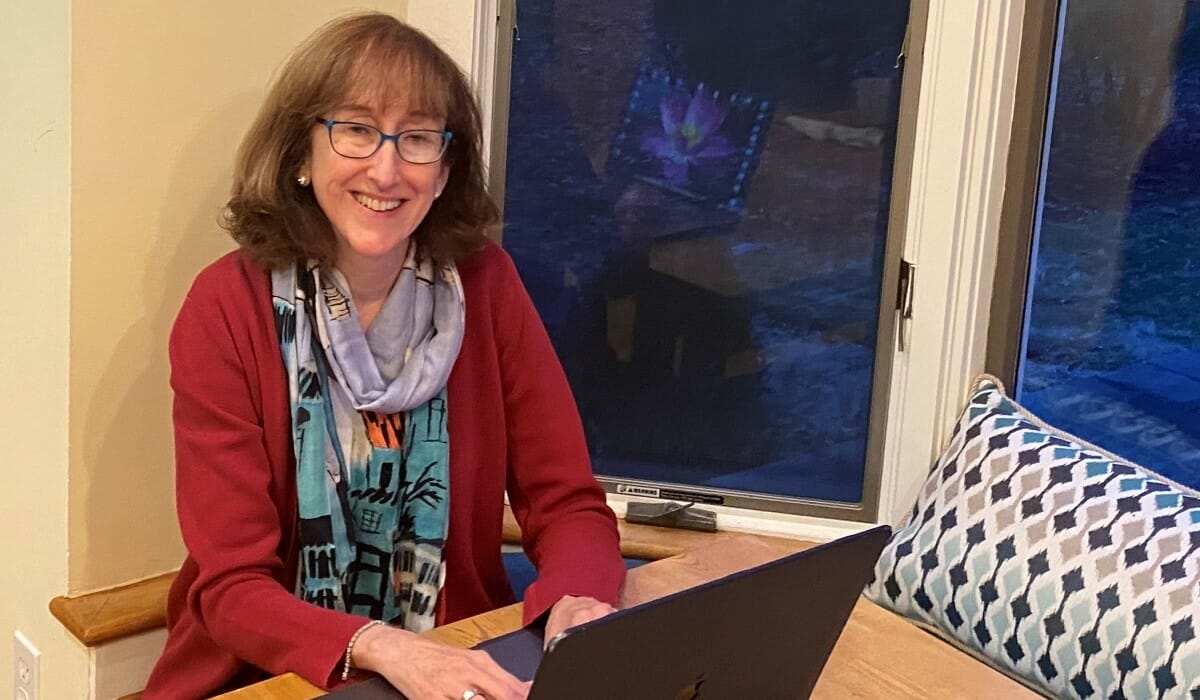Volunteer Helps Frontline Workers Process Pandemic Trauma and Grief

Meet Daily Point of Light Award honoree Kerry Malawista, Ph.D. Read her story and nominate an outstanding volunteer or family as a Daily Point of Light.
As a psychotherapist and psychoanalyst in private practice, Kerry Malawista, Ph.D., says she was seeing the ravages of the COVID-19 pandemic in her own patients. “I was seeing patients online and two patients,” says Kerry, “one ER doctor and one registered nurse were coming in all year on Zoom just describing the horrors and grief they were experiencing.”
Kerry launched The Things They Carry after the one year anniversary of the start of the pandemic in response to the shock and debilitation frontline workers were still experiencing. Helping healthcare workers and first responders to process traumatic memories, TTTC workshops pair clinicians with skilled writers, the pairs in turn supporting participants as they get their feelings on paper, the writing offering a safe and supportive environment to make sense of their experiences. Connecting with more than 700 participants from across the United States, Africa, Brazil and England, Kerry’s service is building healthier communities across the globe.
What inspires you to volunteer?
I work as a psychotherapist so I’ve always been interested in helping people. I was amazed at how many people wanted to give back, just to thank the frontline workers.
Your volunteerism unites frontline workers. Explain.
We offer free virtual writing sessions for any kind of frontline worker, up to six participants in a group, from doctors to nurses, aides to hospice workers. The participants are every different age and ethnicity and what’s so moving is that none of that matters, they’re all just sharing their experience and to see the support they offer each other is really amazing.

Describe your volunteerism with The Things They Carry Project.
The patients I was seeing kept saying they couldn’t process what they’d been through, they were exhausted and worn out. I am a writer so I know how writing can help the healing process. We show frontline workers how to put their experiences into words using all their senses to help detail the pain of this pandemic year. As founder of TTTC, I conduct training for all volunteers, pair the 120 therapist and writer volunteers up and then help to coordinate sessions. I also manage communications and marketing.
Share one personal story with me from your volunteerism.
I’ve gotten amazing letters. One was particularly profound, this ER doctor found our groups so powerful and moving, she left medicine. She just realized she no longer belonged in medicine. Not that our work is trying to get people to leave medicine, but that was the effect it had on her. I feel like I’m getting more back from volunteering than [our participants] are.
Why do you think it’s important for others to give back?
Anytime we have something more than others, to give back is essential. We grow from giving as much as the person who receives.
What’s the future look like for your volunteerism?
It’s been a work in progress. Many of our groups have gone so well the leaders continue on after the three week workshops. We keep getting sign-ups, so we keep going. I’m also putting together a book of writings gathered from our group sessions so the community can learn from those experiences.
What do you want people to learn from your story?
The power you can have from an idea if you really believe in it and put it out there. People can do so much more than they would ever think (laughs.) I would have never thought to put together this project, but one person can make a difference.
In two words, what does volunteering mean to you?
Giving back.
How can readers help?
We are accepting participants for our workshops. Please visit our website to learn more and spread the word to frontline workers.
Do you want to make a difference in your community like Kerry Malawista? Find local volunteer opportunities.
